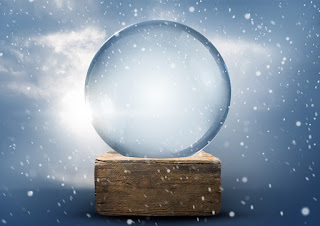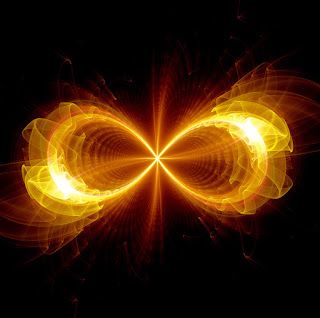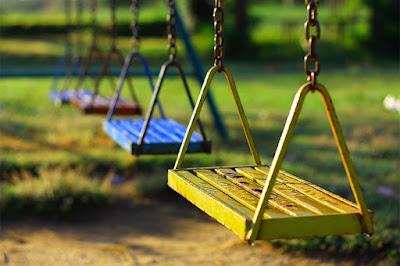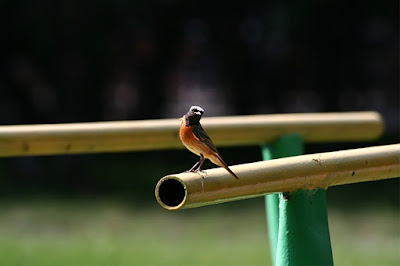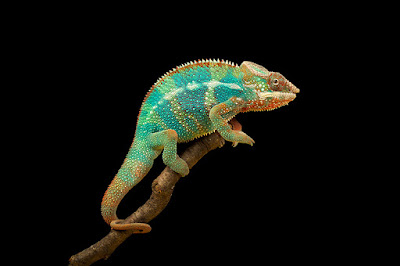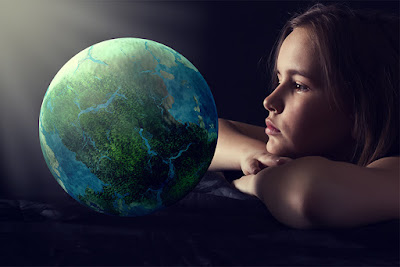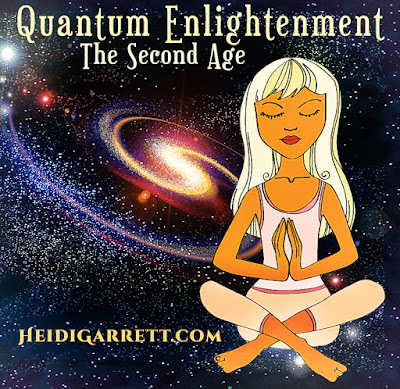I read
God’s Ecstasy by Beatrice Bruteau last year (I think!) It’s a short book (172 pp.) but I read it very slowly because there is simply so much packed into each paragraph.
The book was written in 1997, but 20 years later it’s still a fascinating read. Dr. Bruteau had degrees in mathematics and philosophy, and she was a contemplative Christian. The book represents her effort to bridge the new insights quantum mechanics has provided about our Cosmos and her religion. I don't think her bridge fully crosses the gorge, but it’s a thought-provoking work.
She relies on three essential Christian religious symbols as the foundation for her thesis: the Incarnation, the Theokotos, and the Trinity. The Incarnation and the Theokotos work well for me as symbolical representations of potent spiritual/metaphysical reality but I confess, whenever she dove into the Trinity, everything became convoluted for me.
The book’s first three chapters discuss her broad views of the universe as “the creation of a self-creating world.”
“the Godmade universe is made as a self-making universe” and
“to share in the divine life I must accept the vocation of consciously living in the self-creating universe”
“Joining in the creative work is really central to the whole contemplative enterprise”
“What Earth and the other heavenly bodies are manifesting is the glory, the overflowing creativity activity, that necessarily expresses and thus images the Creator.”
“When we are conscious and knowing the universe is conscious and knowing.”
The final quote is an idea I myself have been pondering for over two decades, that through each of us, through the experience of our lives, the universe and the Infinite become more knowing which would mean that each and every one of the moments of our existence is recorded—felt? received?—by this massive consciousness …
If that’s the case, nothing is meaningless … or static … because everything is constantly in flux as more becomes known.
In Chapters 4 through 7, Bruteau traces the evolution of the universe and some of the potential spiritual implications of that history. In her march through time, Bruteau discuses:
The Big Bang, the Inflation Scenario, Phase Transitions (
“it may be that the idea of phase transition is an excellent way to see the whole picture: the universe evolves and ‘self-creates’ by passing through a period of phase transitions."), the stars, astrophysicists, quantum mechanics, the earth’s molten beginnings, symbiotic chemistry and bond formation, molecules of life: sugars, nucleic acids, and proteins, enzymes, catalysts, DNA, RNA, autocatalytic circles, hypercycles, emergents, the first cells, bacteria rule the world (
“Bacteria are the ultimate in promiscuity. They engage in gene-swapping all the time.”), oxygen and the eukaryotic cell, diploid nuclei and meiosis, gametes, selection and adaptation, gene wars, and junk DNA, consciousness, language, and memes.
Whew. Makes your head spin! Here are some of her conclusions:
“The interactions are complicated. Organisms have to struggle with the environment, yet the environment is what sustains them. They often fight with members of their own kind, yet they also care for own kind, in some circumstance’s at the individual’s considerable expense. They may be in a predatory/prey relationship with other species, or again they may be in a symbiotic relationship of mutualism, in which each helps the other. The struggles against each other usually lead to discovering better ways to succeed in the struggle, first by one side, then the other. Even better ways to find better ways are developed, better ways to evolve are evolved.
It is one long fascinating story of the creation of novelty.”
“[Nature] is constantly renewing itself and constantly giving rise to forms that never existed before. And the most exciting thing about this novelty is that it is unpredictable. A theology that imagines that the whole history of the world from start to finish is already known is no longer a source of meaningfulness for us. It is not true to our experience.”
“Everywhere there is multiplicity organized into unity, the unity being strongly dependent on the multiplicity and even the diversity … And this is exactly what we see in the world on every level or scale of organization. Galaxies, molecules, organisms, societies—they are all examples of unity supporting and implying multiplicity, and multiplicity sustaining and implying unity.”
“Akin to the conjunction of diversity and unity is the balance of variation and stability…under the conditions of finitude … Randomness and determinism provide for novelty [variety] and stability.”
What’s going on here? Novelty, unpredictability, multiplicity unity, variation … all these words are exciting, inspiring, motivating … and then there is stability. Life needs that too. If we were born and our beings dissolved, i.e. there was no stability, continuity, or constancy of self, how much meaning would be lost? To ourselves? To the universe?
Along with this idea of the need for stability, not a stability that precludes evolution, but a stability of existence, she brings in another interesting concept: Severance.
In a discussion of parenting as the gifting of life as a mirror of the Divine gifting of life, she states:
“One gives being but does not control how it is expressed, one does not know what form it will take, what will happen next, how it will turn out. To pass on the gift of life is to pass on the ability to give the gift of life, and what happens past that point is out of one’s hands. This is that truly makes it a gift of love.”
Ahem. In this particular post I'm not going to discuss those parents—or those children!—who refuse to let go ... we're talking about ideals here!
“Severance is where development starts … and that inevitability involves hurt and failure, but overall, despite, and more often by means of hurts and failure, the whole process becomes more … The closed boundary … is the beginning of selfhood in the finite order … the figure is ‘discrete’, set off, separated … This is the universe’s general tendency to … be discrete and then clump, that’s the basic way of making a universe … when you have … several (from ‘severed)’ discrete bodies, you can have various clumping patterns, and your on your way to variety and creativity … If the universe were just an evenly distributed homogenous continuum of energy there would be no structure: no differences, and hence no creative unions … The great marvel, the great beauty, the great delight of the creative unions to come are dependent on those strange requirements of severance.”
Again, this amazing Cosmos we live in, partake in, is a vast flow of paradoxical elements, we change, grow and evolve in the context of stability, we unite and combine in the context of separation.
And on where we are going …
“Edward Fredkin, an early computer genius, has said that the universe looks to him like a great computer with a program running it. [He also said] the program is so complex that there is no way to shorten it and jump to the final answer. The only way to find out the answer is to let the program run in real time.”
So does any of this matter to us, to our daily lives, to our personal relationships? Does it have any impact on our goals and dreams whether they be for world peace or to create a family?
Consider Bruteau’s thoughts on Divine Intervention ….
“… The Infinite does not ‘intervene’ in the finite. The infinite as a whole is ‘exegeted’ in the whole of the finite, but the Infinite cannot be a participant in any interactions between the finite beings because that would finitize it. Only finite beings can be agents in finite interactions. The infinite can be ‘present’ in and even as the whole finite world, but it cannot be some particular part of the finite world or control some particular interaction in the finite world. All finite interactions are defined from particular points of view, and the Infinite cannot take one point of view rather than another. While this may be disappointing, it also relieves us of otherwise intractable problems, especially questions about why the Infinite doesn’t intervene in ways we (from our point of view) would like it to do.”
This strikes me as true. And so does this …
“The new things build on the old things. And as the better working ones crowd out the poorer ones, the population as a whole comes to be characterized by innovations. Those innovations then become part of the foundation on which the next round of innovations is built … But all this comes out of the dynamics, the process, the functions of the spontaneously assembling natural bodies. Nothing is imposed from the outside. There is no guiding hand. Each stage of organization leads naturally to the next on the basis of the way things are already happening. We are modeling a universe that makes itself, from the inside out, as an act of ecstasy, not one that is made from the outside by imposition.”
Then there comes the procession of evil from the biological imperative to survive onward to a what might be considered a higher consciousness.
The protectionism, aggression, deception of the “selfish-gene” advances to alliances for mutual benefit then advances to a reciprocal altruism based on memory, i.e. I will likely have future interactions with you and that advances to the recognition of the “rights of others’” by way of acknowledging the Absolute/Infinite as a mutual Ground of Being. So that
“the real basis for sin (I know, a word replete with a millennia of baggage; I would use a word more akin to suffering myself )
… is the failure to find the Absolute in oneself.”
Okay.
So the Theokotos, a Greek word meaning ‘God-bearer’ used traditionally for the Virgin Mary, makes me think of all our mothers as physical vessels giving birth to the infinite in finite form.
We all have the potential to “incarnate” divinity.
How do we do this? Well, folks have been trying to do this for aeons by praying, fasting, meditating, taking pilgrimages, studying sacred texts … Does any of it work? Seems like to a degree. Is it a worthy cause? Effort? Probably only if you believe it to be so. I just don’t think it’s a pursuit that one can be forced or shamed or otherwise coerced into. I also think the process of living itself evolves us, so how much focused effort is actually required?
I don’t know. Regardless, I emphatically do believe that:
“Divinity is within you: it is growing toward emergence.”
So here on this planet, there likely never will be any direct Divine Intervention … there is and will only ever be us and our thoughts and actions. The question is, by cultivating our inner connection to the Divine/Infinite how might our outer/finite world be transformed?
Will there ever come a day when everyone on the planet lives according to this state of being inwardly connected to the Divine? Is this where we're ultimately headed?
Honestly, I hope so.
In
War & Grace, I call it Eryai;)
All quotes for this post are from: God's Ecstasy by Beatrice Bruteau













